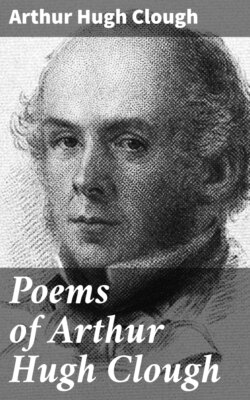Читать книгу Poems of Arthur Hugh Clough - Arthur Hugh Clough - Страница 46
На сайте Литреса книга снята с продажи.
Scene XIII.
Adam and Cain.
ОглавлениеCain. My father, Abel’s dead.
Adam. My son, ’tis done, it was to be done; some good end
Thereby to come, or else it had not been.
Go, for it must be. Cain, I know your heart,
You cannot be with us. Go, then, depart;
But be not over scrupulous, my son.
Cain. Curse me, my father, ere I go. Your curse
Will go with me for good; your curse
Will make me not forget,
Alas! I am not of that pious kind,
Who, when the blot has fallen upon their life,
Can look to heaven and think it white again—
Look up to heaven and find a something there
To make what is not be, altho’ it is.
My mother—ah, how you have spoke of this!
The dead—to him ’twas innocence and joy,
And purity and safety from the world:
To me the thing seems sin—the worst of sin.
If it be so, why are we here?—the world,
Why is it as I find it? The dull stone
Cast from my hand, why comes it not again?
The broken flow’ret, why does it not live?
If it be so,
Why are we here, and why is Abel dead?
Shall this be true
Of stocks and stones and mere inanimate clay,
And not in some sort also hold for us?
Adam. My son, Time healeth all,
Time and great Nature; heed her speech, and learn.
Cain. My father, you are learned in this sort:
You read the earth, as does my mother heaven.
Both books are dark to me—only I feel
That this one thing
And this one word in me must be declared;
That to forget is not to be restored;
To lose with time the sense of what we did
Cancels not that we did; what’s done remains—
I am my brother’s murderer. Woe to me!
Abel is dead. No prayers to empty heaven,
No vegetative kindness of the earth,
Will bring back warmth into his clay again,
The gentleness of love into his face.
Therefore, for me farewell;
Farewell for me the soft,
The balmy influences of night and sleep,
The satisfaction of achievement done,
The restorative pulsing of the blood
That changes all and changes e’en the soul—
And natural functions, moving as they should,
The sweet good-nights, the sweet delusive dreams
That lull us out of old things into new.
But welcome Fact, and Fact’s best brother, Work;
Welcome the conflict of the stubborn soil,
To toil the livelong day, and at the end,
Instead of rest, recarve into my brow
The dire memorial mark of what still is.
Welcome this worship, which I feel is mine;
Welcome this duty—
—the solidarity of life
And unity of individual soul.
That which I did, I did, I who am here:
There is no safety but in this; and when
I shall deny the thing that I have done,
I am a dream.
Adam. My son,
What shall I say?
That which your soul, in marriage with the world,
Imbreeds in you, accept;—how can I say
Refuse the revelations of the soul?
Yet be not over scrupulous, my son,
And be not over proud to put aside
The due consolements of the circling years.
What comes, receive; be not too wise for God.
The past is something, but the present more;
Will not it too be past?—nor fail withal
To recognise the future in our hopes;
Unite them in your manhood each and all,
Nor mutilate the perfectness of life.
You can remember, you can also hope;
And, doubtless, with the long instructive years,
Comfort will come to you, my son, to me,
Even to your mother, comfort; but to us
Knowledge, at least—the certainty of things
Which, as I think, is consolation’s sum.
For truly now, to-day, to-morrow, yes,
Days many more to come, alike to you,
Whose earliest revelation of the world
Is, horrible indeed, this fatal fact—
And unto me, who, knowing not much before,
Look gropingly and idly into this,
And recognise no figure I have seen—
Alike, my son, to me, and to yourself,
Much is now dark which one day will be light;
With strong assurance fortify your soul
Of this: and that you meet me here again,
Promise me, Cain. Farewell, to meet again.
